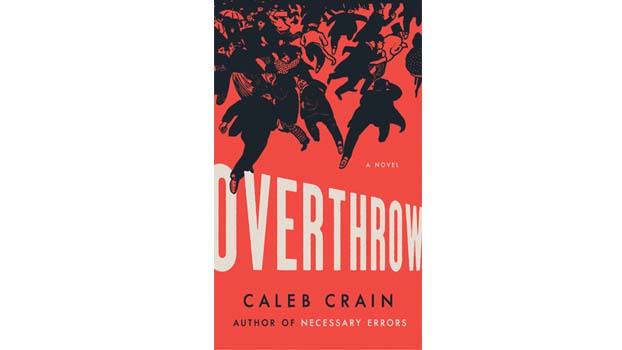Book Talk
Overthrow by Caleb Crain

Annalisa Quinn
Given enough information about online behavior, a computer can guess someone's personality traits better than a friend, parent, or even a spouse, according to a 2015 study from researchers at Stanford and Cambridge.
‘Overthrow’, a perceptive (if overlong) new novel by Caleb Crain, unpicks this new reality: Its protagonists want to not only destroy the digital surveillance apparatus, but to see if it is possible to know each other better than the machines do.
The novel begins with a pickup. Matthew, a graduate student in his 30s, is walking home one night when he becomes aware of a skateboarder with a "moonglow complexion" rolling toward him. They say hi. Matthew quickly realizes that Leif — the skateboarder — is the leader of a group called, semi seriously, "The Working Group for the Refinement of the Perception of Feelings." (Mind reading is a cruder way of putting it.)
The group, loosely affiliated with the Occupy movement, soon takes on a political color. Could they use this hypersensitivity for political aims? Codebreaking? Guessing passwords? Cracking "government secrets" and uncovering "corporate misdoings"?
They attempt a clumsy hacking of a government subcontractor, and are caught and charged. Soon the members are notorious, called "the Telepathy Four," circled endlessly by journalists, lawyers, and other predatory birds. The group begins to fray: One turns state's witness, another, a perfectly drawn rich girl in a beret, decides to write a book about the whole thing. Leif unravels.
The phrase "mind reading" is ultimately a red herring, a question of word choice more than superstition. Leif describes it as an ability that "either was, or was inextricable from, a supersensitive variety of tact ..." In fact, the novel is seeded with quotidian forms of mind reading: The casual assessment you do of a new friend's bookshelf, or the way you might look into a lighted window for a sense of lives that aren't yours. Emotional intelligence. Attention.
We are all watched, more or less constantly. But can we find a way to keep our lives from taking on a cautious, surveilled character, so nothing we do is really free or honest?
‘Overthrow’ is a carefully unsentimental book, or at least an ambivalent one. Happiness and sadness are both always partial, even in Crain's descriptions of the weather: "It was one of those late fall days that the warming of the world had rendered so temperate and brilliant." And though the book is long and sometimes lagging, it is full of sentences of great sensitivity and precision: "She couldn't tell him that he had become lackluster to her, so she said what she could: 'There's someone else.'"
The group's talent finds a dark twin in the kind of close, almost loving attention increasingly paid to our tastes, habits, and preferences by computers. In ‘Overthrow’, close listening, mind reading, algorithmic prediction blur together. Is surveillance — government or corporate — so different from intimate attention? As a potential partner of the shady subcontractor puts it:
What I see, when I close my eyes is a world where no one is ever lost, where because of the functionality that you've developed, the not quite overlapping, not always intersecting multiple data sets that people create every day, every hour, every minute, with their phones and their emails and their credit cards and their smart TVs and their social media accounts and their streaming music services and their employee ID badges and the toll-paying devices in their cars and their cars' navigation systems and the loyalty barcode dongles on their keychains are all quietly, constantly reconciled. And therefore no gesture goes unnoticed. No signal goes unreceived ... What I'm imagining will be a glove that fits so well that most people will forget they're wearing it.
"That's beautiful," the subcontractor responds. "We'll know more about them under their anonymized identifiers than their mothers know about them under their names."
The Telepathy Four and their friends don't expect to keep this dystopian future from becoming real. It is already here: We are all watched, more or less constantly. But can we find a way to keep our lives from taking on a cautious, surveilled character, so nothing we do is really free or honest? ‘Overthrow’ finds redemption at the place where "telepathy" shades into empathy: "In the new world, everything was always going to be exposed anyway. In the universal light everyone was going to have to come to better, more forgiving understandings of each other."


